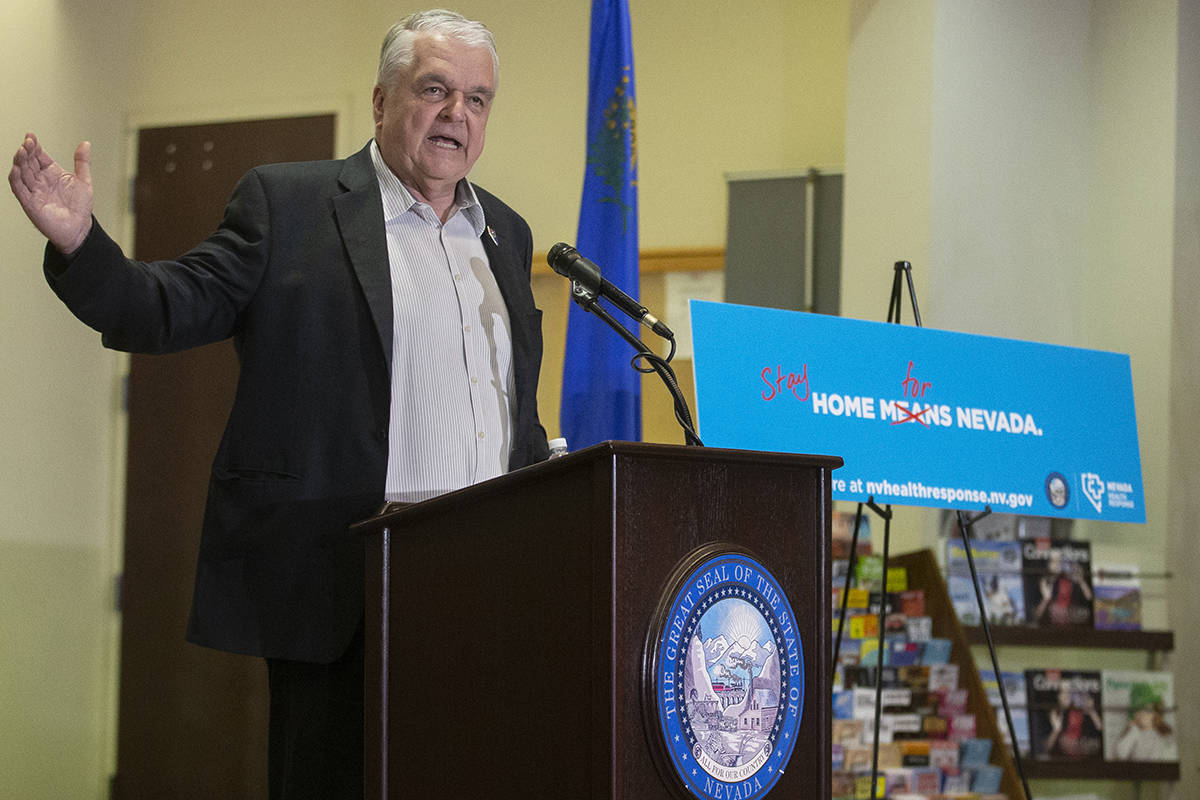Coronavirus crisis putting big hurt on Nevada’s state budget
As casinos and other businesses close in Nevada, economists in the state are in the early stages of figuring out just how bad the COVID-19 virus’ impact on state finance will be, and how long it will take the state to recover.
Guy Hobbs, president and managing partner of financial consulting firm Hobbs, Ong and Associates, said the economic severity of the pandemic is getting clearer by the day. But how hard the coronavirus hits Nevada fiscally depends on how long the crisis lasts.
But the recovery, Hobbs said, is unlikely to happen overnight.
Gov. Steve Sisolak on Tuesday ordered a shutdown of casinos in the state for 30 days. Nonessential businesses have also been directed to close, though the closures are apparently optional.
That has real implications for multiple revenue streams for the state.
Sales tax and gambling taxes together account for more than 46 percent of Nevada’s general fund income, according to the Guinn Center. Gambling alone accounts for about 17.5 percent of the state’s general fund revenue.
Live entertainment and payroll taxes will also take a hit, Hobbs said.
Much to lose
The state Gaming Control Board monitors gaming win in 19 markets across the state every month. Tax rates are variable up to a maximum 6.75 percent and the proceeds go to the state’s general fund.
In January, the last month reported, gamblers lost $1.038 billion in Nevada casinos. That resulted in tax collections of $73 million for the month.
Michael Lawton, senior research analyst for the Control Board, said officials won’t know the cost of the shutdown for sure until the end of April when March gaming win and tax collections are tabulated. April collections also will be affected since Sisolak’s shutdown order will extend into the middle of that month.
The first four months of the year usually are strong with a robust convention schedule that includes visitation for CES, MAGIC, the Shooting, Hunting, Outdoor Trade show, World of Concrete, the National Association of Broadcasters and, this year, ConExpo-Con/Agg, which appears in the city every three years.
March also is a big sports visitation month with the NCAA’s March Madness basketball tournament on sportsbook video screens and the first of two of the city’s NASCAR races at the Las Vegas Motor Speedway. Sports bettors also tend to bet more frequently toward the end of the National Hockey League schedule and into the Stanley Cup playoffs, which were to begin in April.
The coronavirus has already wiped out the basketball tournament and the NHL, but the NASCAR race was run before the virus took hold.
Though Lawton won’t venture a guess on win and tax collections, it’s clear it isn’t going to be pretty for March or April.
Las Vegas remains among the metropolitan areas most vulnerable to face a recession, according to the Brookings Institution. About one-third of the workforce has a job in an industry at risk from COVID-19.
‘Anything but normal’
Nevada has about $400 million in budget reserves, according to Jeremy Aguero, principal analyst for Applied Analysis.
But when there is significant shutdown in the state, that money can be used quickly. School districts, he said, could need the money sooner because districts don’t have much money left over at the end of the fiscal year.
“That reserve was designed to help Nevada weather a normal economic downturn,” Aguero said. “This is anything but a normal economic downturn.”
How to fight off the negative effects of losing out on tax revenue is a difficult question to answer, Aguero said. But what could help is keeping as many people working as can be responsibly accomplished, he said.
The state faces challenges with an over-dependence on tourism, a narrow sales tax base and a number of purchases not subject to sales tax, he said.
“These are all things that have the potential of being revisited and could help stabilize our tax system,” Aguero said.
But until Nevada gets through the public health crisis and economic challenge it creates, it’s hard to tell how much it will hurt the government.
Aguero said although it has been discussed, it is premature to say a special legislative session is inevitable.
Because gambling and tourism are core to the Nevada’s economy, state Sen. Joyce Woodhouse said she expects the state to be among the hardest hit. Woodhouse, chairwoman of the Senate Finance Committee, said it’s too early to tell whether a special legislative session will be necessary. It’s also too early to tell how dips in tax revenue will affect the state, she said.
“It’s all a moving target at this point, I guess” she said.
Contact Blake Apgar at bapgar@reviewjournal.com or 702-387-5298. Follow @blakeapgar on Twitter. Contact Richard N. Velotta at rvelotta@reviewjournal.com or 702-477-3893. Follow @RickVelotta on Twitter.

















